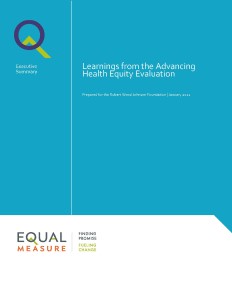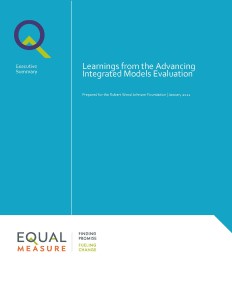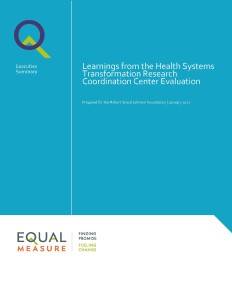A series of Equal Measure evaluations over two years examines three programs of the Robert Wood Johnson Foundation (RWJF) that address persistent health inequities and aim to create more equitable health systems. The findings elevate the programs’ innovative approaches to payment reforms, integrative models of care, and health systems research. These observations and recommendations will inform current program structures and provide future learning for the field.
RWJF’s Transforming Health and Health Care Systems focus area supports models and systems in the U.S. that advance health equity and seek to improve and reimagine the health care system. RWJF-funded programs take on different facets of health systems change, with a number of them focused on Medicaid. To help RWJF understand the impact of its grantmaking, we embarked on a two-year learning and evaluation journey (July 2020–June 2022) for three of those programs:
Advancing Health Equity (AHE), led by the University of Chicago, Center for Health Care Strategies, and Institute for Medicaid Innovation, brings together seven state teams to reduce and eliminate disparities in health care through new payment reforms and practices. Interviews surfaced the importance of building cross-sector relationships—such as those between state Medicaid agencies, managed care organizations, and provider organizations—to create long-term strategies for health equity, among other findings.
Advancing Integrated Models (AIM), led by the Center for Health Care Strategies, supports health systems and community providers to create new people-centered, integrative models of care. The groups—including AIM leaders, payer partners, and six pilot sites—took different approaches to engage patients and the broader community and show early signs of positive change.
The Health Systems Transformation Research Coordination Center (HSTRC), led by Avalere Health, aims to shift how health system research is generated, funded, and used through a robust research collaborative and research agenda. Our findings focus on strategies and supports to expand and sustain the Center’s research and grantmaking.
Equal Measure took a developmental evaluation approach, integrating learnings and reflections as we progressed in the project. As parts of an interconnected whole, we posed both program- and focus-area-level evaluation questions to understand the programs and their shared themes. The project further evolved in the wake of the COVID-19 pandemic and ongoing racial justice movement—events that continue to shape our work.
The learnings, distilled into three executive summaries, draw upon interviews across 16 states and a theory of change developed by Equal Measure for the overall project. The summaries include the learning questions that drove each evaluation and subsequent recommendations and considerations. These observations—such as aligning data systems, building resources to support large-scale changes, and further developing equity-centered practices—seek to inform current program structures as well as future learning and growth.


